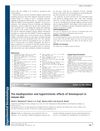 April 2023 in “Journal of Investigative Dermatology”
April 2023 in “Journal of Investigative Dermatology” The research developed methods to test drugs that could protect and restore hair follicle protection in a hair loss condition.
 April 2018 in “The journal of investigative dermatology/Journal of investigative dermatology”
April 2018 in “The journal of investigative dermatology/Journal of investigative dermatology” miR-486 may help prevent hair loss in alopecia areata.

The CD4 protein may play a role in the behavior of certain skin cells, affecting their growth, movement, and differentiation.
 6 citations,
January 2013 in “Experimental dermatology”
6 citations,
January 2013 in “Experimental dermatology” Bimatoprost increases hair growth in mice without breaking down into other substances.
 February 2018 in “Trends in Immunology”
February 2018 in “Trends in Immunology” Skin bacteria can help wound healing by activating certain immune cells.
 1 citations,
August 2023 in “Gels”
1 citations,
August 2023 in “Gels” The hydrogel with silver and ibuprofen promotes wound healing and fights infection.
 November 2022 in “The journal of investigative dermatology/Journal of investigative dermatology”
November 2022 in “The journal of investigative dermatology/Journal of investigative dermatology” IL-15 promotes hair growth and protects hair follicles.
 6 citations,
January 2021 in “Frontiers in Immunology”
6 citations,
January 2021 in “Frontiers in Immunology” Certain immune cells worsen post-surgery gut paralysis by activating a specific immune response.
15 citations,
January 2023 in “Antioxidants” Oxidative stress plays a significant role in alopecia areata, and new treatments may include JAK inhibitors and antioxidants.
 159 citations,
December 2007 in “American Journal of Pathology”
159 citations,
December 2007 in “American Journal of Pathology” Stress-related substance P may lead to hair loss and negatively affect hair growth.
 April 2017 in “Journal of Investigative Dermatology”
April 2017 in “Journal of Investigative Dermatology” A virus protein can activate a pathway that may lead to abnormal hair follicle development.
 August 2022 in “Revista de la Universidad Industrial de Santander/Salud UIS”
August 2022 in “Revista de la Universidad Industrial de Santander/Salud UIS” Stress-related hair loss was reversed with a special medication.
 306 citations,
April 2019 in “International Journal of Molecular Sciences”
306 citations,
April 2019 in “International Journal of Molecular Sciences” The skin has a complex immune system that is essential for protection and healing, requiring more research for better wound treatment.
 1 citations,
August 2023 in “Advanced Drug Delivery Reviews”
1 citations,
August 2023 in “Advanced Drug Delivery Reviews” Microneedles are promising for long-acting drug delivery and can improve patient compliance, but more data is needed to confirm their effectiveness.
 4 citations,
May 2021 in “Biomedicines”
4 citations,
May 2021 in “Biomedicines” Targeting the protein Caveolin-1 might help treat a type of scarring hair loss called Frontal Fibrosing Alopecia.
 1 citations,
August 2023 in “Frontiers in immunology”
1 citations,
August 2023 in “Frontiers in immunology” Traditional Chinese medicinal foods may help manage long-term post-COVID symptoms.
 14 citations,
March 2022 in “Journal of inflammation research”
14 citations,
March 2022 in “Journal of inflammation research” Baricitinib shows promise as a new treatment for certain skin conditions like alopecia areata.
 July 2023 in “The Egyptian Journal of Hospital Medicine ”
July 2023 in “The Egyptian Journal of Hospital Medicine ” The conclusion is that emotional support and a variety of treatments are important for alopecia areata, but more research is needed.
 April 2018 in “The journal of investigative dermatology/Journal of investigative dermatology”
April 2018 in “The journal of investigative dermatology/Journal of investigative dermatology” Biotrinine® may be an effective treatment for chronic hair loss.
 36 citations,
April 2016 in “British journal of dermatology/British journal of dermatology, Supplement”
36 citations,
April 2016 in “British journal of dermatology/British journal of dermatology, Supplement” A substance called VIP might protect hair follicles from being attacked by the immune system, and problems with VIP signaling could lead to hair loss in alopecia areata.
 January 2023 in “Discovery immunology”
January 2023 in “Discovery immunology” T cells and bacteria in the gut and skin help maintain health and protect against disease.
 April 2017 in “Journal of Investigative Dermatology”
April 2017 in “Journal of Investigative Dermatology” The protein CTCF is essential for skin development, maintaining hair follicles, and preventing inflammation.
 40 citations,
August 2022 in “Frontiers in immunology”
40 citations,
August 2022 in “Frontiers in immunology” Blocking JAK/STAT pathways can help treat hair loss from alopecia areata.
 12 citations,
May 2017 in “Pharmacology & therapeutics”
12 citations,
May 2017 in “Pharmacology & therapeutics” Targeting immune tolerance issues in Alopecia Areata could restore hair growth and maintain remission.
 1 citations,
April 2017 in “Journal of Investigative Dermatology”
1 citations,
April 2017 in “Journal of Investigative Dermatology” Cilostazol may help hair grow and could be a new treatment for hair loss.
 61 citations,
September 2010 in “Genomics”
61 citations,
September 2010 in “Genomics” The study found that immune responses disrupt hair growth cycles, causing hair loss in alopecia areata.
 3 citations,
January 2024 in “Signal transduction and targeted therapy”
3 citations,
January 2024 in “Signal transduction and targeted therapy” Lymphatic vessels are essential for health and can be targeted to treat various diseases.
 April 2018 in “The journal of investigative dermatology/Journal of investigative dermatology”
April 2018 in “The journal of investigative dermatology/Journal of investigative dermatology” Ginseng and Albizia extracts may help prevent age-related hair thinning.
 June 2022 in “bioRxiv (Cold Spring Harbor Laboratory)”
June 2022 in “bioRxiv (Cold Spring Harbor Laboratory)” ILC1-like cells can cause alopecia areata by attacking hair follicles.
169 citations,
February 2018 in “Immunity” Inactive stem cells in hair follicles and muscles can avoid detection by the immune system.



























